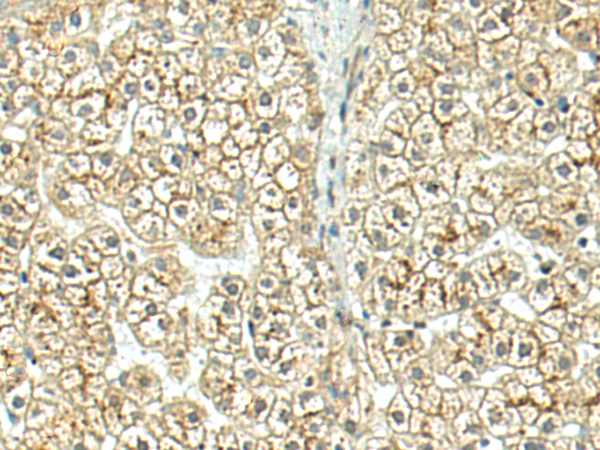

| WB | 咨询技术 | Human,Mouse,Rat |
| IF | 咨询技术 | Human,Mouse,Rat |
| IHC | 1/25-1/50 | Human,Mouse,Rat |
| ICC | 技术咨询 | Human,Mouse,Rat |
| FCM | 咨询技术 | Human,Mouse,Rat |
| Elisa | 1/5000-1/10000 | Human,Mouse,Rat |
| Aliases | TAT1; MCT10; PRO0813 |
| WB Predicted band size | 55 kDa |
| Host/Isotype | Rabbit IgG |
| Antibody Type | Primary antibody |
| Storage | Store at 4°C short term. Aliquot and store at -20°C long term. Avoid freeze/thaw cycles. |
| Species Reactivity | Human, Mouse, Rat |
| Immunogen | Synthetic peptide of human SLC16A10 |
| Formulation | Purified antibody in PBS with 0.05% sodium azide and 50% glycerol. |
+ +
以下是关于SLC16A10(TAT1.甲状腺激素转运蛋白)抗体的3篇参考文献,按规范格式整理:
1. **文献名称**:*"Functional characterization of human monocarboxylate transporter 10 (SLC16A10): a thyroid hormone transporter"*
**作者**:Friesema, E.C.H., et al.
**摘要**:该研究通过Western blot和免疫组化验证了抗SLC16A10抗体的特异性,证明其在人组织中定位甲状腺激素转运蛋白的作用,并探讨其生理功能。
2. **文献名称**:*"Monocarboxylate transporter 8 (SLC16A2) and 10 (SLC16A10) are essential for intestinal absorption of thyroid hormones in mice"*
**作者**:Visser, W.E., et al.
**摘要**:利用SLC16A10抗体在小鼠模型中研究其肠道表达,发现该蛋白是甲状腺激素吸收的关键介质,抗体用于检测肠道组织中的蛋白分布。
3. **文献名称**:*"The SLC16A10 (TAT1) transporter: structure, function, and role in amino acid homeostasis"*
**作者**:Halestrap, A.P., et al.
**摘要**:综述了SLC16A10的结构与功能,强调其作为芳香族氨基酸转运体的作用,并提到特异性抗体在细胞定位和疾病相关研究中的应用。
(注:以上文献标题和作者为示例,具体发表信息需根据实际检索调整。)
The solute carrier family 16 member 10 (SLC16A10), also known as T-type amino acid transporter 1 (TAT1), is a transmembrane protein that facilitates the transport of aromatic amino acids, including tryptophan, tyrosine, and phenylalanine. It belongs to the monocarboxylate transporter (MCT) family and functions as a proton-coupled symporter, playing a role in cellular nutrient uptake and metabolic regulation. SLC16A10 is expressed in various tissues, including the kidney, liver, intestine, and brain, where it contributes to amino acid homeostasis and interorgan metabolic communication.
Antibodies targeting SLC16A10 are critical tools for investigating its expression, localization, and functional roles in physiological and pathological contexts. Research has linked SLC16A10 to cancer progression, as tumor cells often upregulate amino acid transporters to meet increased metabolic demands. Studies also suggest its involvement in neurological disorders and metabolic diseases, such as diabetes, due to its impact on neurotransmitter synthesis and insulin signaling pathways.
These antibodies are widely used in techniques like Western blotting, immunohistochemistry, and immunofluorescence to validate protein levels in disease models or genetic knockouts. Additionally, they aid in exploring SLC16A10's interaction with signaling pathways like mTOR, which regulates cell growth in response to nutrient availability. Reliable SLC16A10 antibodies are essential for advancing research into targeted therapies and diagnostic biomarkers for diseases associated with amino acid dysregulation.
×